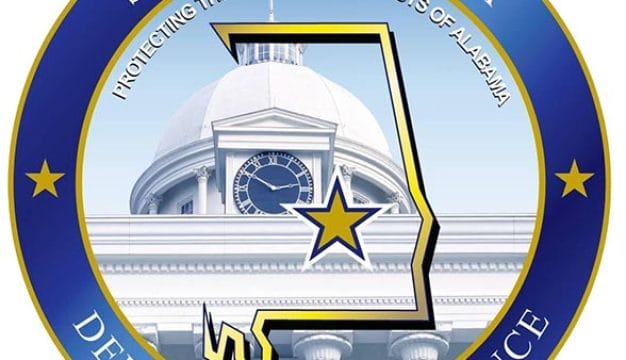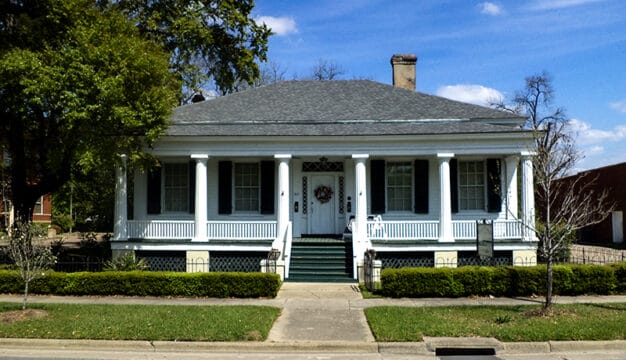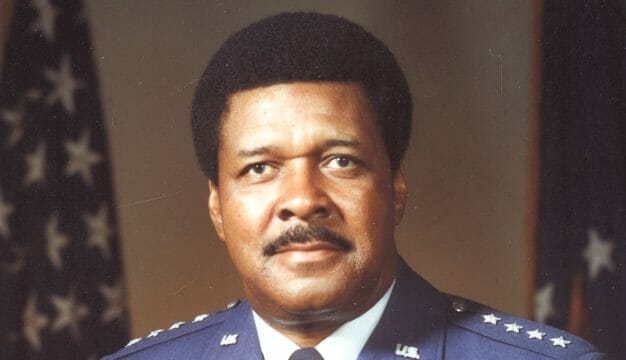Blind Boys of Alabama
The Blind Boys of Alabama, also billed as The Five Blind Boys of Alabama or Clarence Fountain and the Blind Boys of Alabama, is one of the best-known African American gospel groups in the world, with a career spanning more than six decades and more than 60 albums.
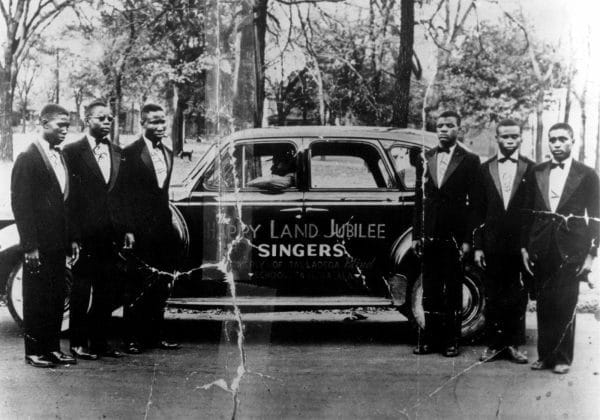 Happy Land Jubilee Singers
In 1939, at what was then known as the Alabama Institute for the Negro Deaf and Blind in Talladega (now the Alabama Institute for the Deaf and Blind), six members of the school’s male chorus began to sneak off campus and perform gospel music as the Happy Land Jubilee Singers. The large number of military training camps in the South during World War II provided an early audience. In 1945, the six—Clarence Fountain, Velma Bozman Traylor, Johnny Fields, Ollice Thomas, George Scott, and the only sighted member, J. T. Hutton (who was a friend of Fountain and Traylor)—dropped out of school and started touring the gospel circuit. Lead singer Traylor died in a gun accident in 1947, but the group, now called the Happy Land Gospel Singers, continued to have success. In 1948 at Newark, New Jersey, they performed with another group of blind singers, the Jackson Harmony. Clever promotion billed the event as a battle between the Blind Boys of Alabama and the Blind Boys of Mississippi, names that stuck for both groups. Lively concerts concluded with a singing competition between Alabama’s Fountain and the lead singer of the Mississippi group, Archie Brownlee.
Happy Land Jubilee Singers
In 1939, at what was then known as the Alabama Institute for the Negro Deaf and Blind in Talladega (now the Alabama Institute for the Deaf and Blind), six members of the school’s male chorus began to sneak off campus and perform gospel music as the Happy Land Jubilee Singers. The large number of military training camps in the South during World War II provided an early audience. In 1945, the six—Clarence Fountain, Velma Bozman Traylor, Johnny Fields, Ollice Thomas, George Scott, and the only sighted member, J. T. Hutton (who was a friend of Fountain and Traylor)—dropped out of school and started touring the gospel circuit. Lead singer Traylor died in a gun accident in 1947, but the group, now called the Happy Land Gospel Singers, continued to have success. In 1948 at Newark, New Jersey, they performed with another group of blind singers, the Jackson Harmony. Clever promotion billed the event as a battle between the Blind Boys of Alabama and the Blind Boys of Mississippi, names that stuck for both groups. Lively concerts concluded with a singing competition between Alabama’s Fountain and the lead singer of the Mississippi group, Archie Brownlee.
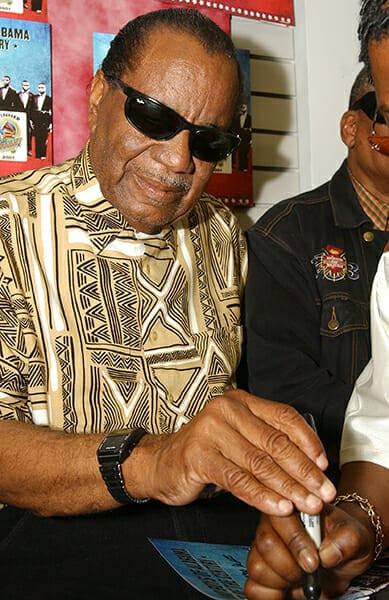 Clarence Fountain
In the 1950s and early 1960s, the Blind Boys was one of the leading black gospel groups, but the market for gospel music declined as rhythm and blues musicians began to incorporate traditional gospel sounds. Limited economic opportunities and disagreements over the prominence of lead singer Fountain led to his leaving the group to pursue a solo career in 1969. Neither he nor the remaining Blind Boys found much success in the 1970s, even after Fountain rejoined the group in 1977. The group’s fortunes began to change in 1983, however, when they were cast in The Gospel at Colonus, a theatrical musical version of Sophocles’ Oedipus at Colonus as told in a black Pentecostal church. The show won an Obie (off-Broadway) Award for best musical in 1984 before opening on Broadway in 1988, reviving the Blind Boys’ career and spreading African American gospel music to new audiences in the United States and Europe. Building on this fame, in the 1990s the Blind Boys began to have crossover success beyond traditional fans of black gospel with a new, mostly white audience. Distinctively covering Bob Dylan’s “I Believe in You” on Deep River, released in 1992, the group received its first Grammy nomination and set the stage for more gospel-inspired covers of mainstream songs. Soon after the Blind Boys signed with Peter Gabriel’s Real World label, the group won a Grammy Award for Best Traditional Gospel Album in 2002 with Spirit of the Century, a feat they repeated three more times with Higher Ground, Go Tell It on the Mountain, and There Will Be a Light, with Ben Harper.
Clarence Fountain
In the 1950s and early 1960s, the Blind Boys was one of the leading black gospel groups, but the market for gospel music declined as rhythm and blues musicians began to incorporate traditional gospel sounds. Limited economic opportunities and disagreements over the prominence of lead singer Fountain led to his leaving the group to pursue a solo career in 1969. Neither he nor the remaining Blind Boys found much success in the 1970s, even after Fountain rejoined the group in 1977. The group’s fortunes began to change in 1983, however, when they were cast in The Gospel at Colonus, a theatrical musical version of Sophocles’ Oedipus at Colonus as told in a black Pentecostal church. The show won an Obie (off-Broadway) Award for best musical in 1984 before opening on Broadway in 1988, reviving the Blind Boys’ career and spreading African American gospel music to new audiences in the United States and Europe. Building on this fame, in the 1990s the Blind Boys began to have crossover success beyond traditional fans of black gospel with a new, mostly white audience. Distinctively covering Bob Dylan’s “I Believe in You” on Deep River, released in 1992, the group received its first Grammy nomination and set the stage for more gospel-inspired covers of mainstream songs. Soon after the Blind Boys signed with Peter Gabriel’s Real World label, the group won a Grammy Award for Best Traditional Gospel Album in 2002 with Spirit of the Century, a feat they repeated three more times with Higher Ground, Go Tell It on the Mountain, and There Will Be a Light, with Ben Harper.
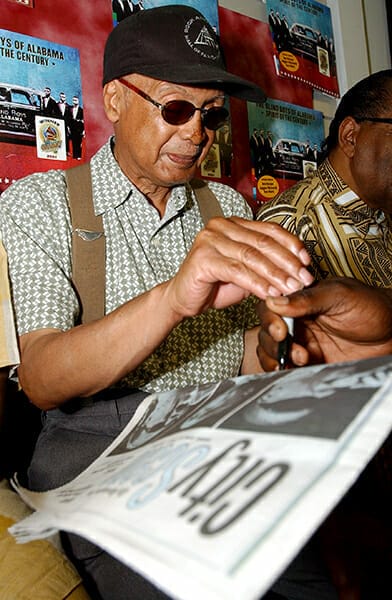 Jimmy Carter
The Blind Boys of Alabama have an unusually broad and varied audience, reflected in the variety of venues at which they appear, including folk and blues festivals, gospel performances, and rock concerts. They have performed songs written by, among others, Prince, Tom Waits, Mick Jagger and Keith Richards of the Rolling Stones, and Curtis Mayfield and have appeared on stage with Ben Harper, Peter Gabriel, Robert Randolph, and Mahalia Jackson. The Blind Boys of Alabama were inducted into the Gospel Music Hall of Fame in 2002, and the group continues to have success. The group’s 2008 album, Down in New Orleans, was released to rave reviews and shows its continuing willingness to experiment, in this case by including jazz ensembles on several tracks. However, age and poor health have taken their toll on group members. George Scott died in 2005, and Clarence Fountain died in 2018. Jimmy Carter is billed as the only founding member of the band still performing. Although he was enrolled at the school and a member of the chorus, he was too young at the time to join when the group first began touring. Despite some controversy, Carter is still described as a founding member of the band, though he did not appear in a recorded performance with the Blind Boys until the 1982 record I’m a Soldier in the Army of the Lord. Into the second decade of the twenty-first century, the group has continued to record and tour, including a 2014 Christmas album with famed blues musician Taj Mahal and an album of original songs, Almost Home, in 2017 on their own BBOA Records label. They opened for fellow Alabamian Jason Isbell in the fall of 2019 in Nashville, Tennessee, and a spring 2020 appearance on the Public Broadcasting Service show Bluegrass Underground was rescheduled owing to the covid-19 pandemic.
Jimmy Carter
The Blind Boys of Alabama have an unusually broad and varied audience, reflected in the variety of venues at which they appear, including folk and blues festivals, gospel performances, and rock concerts. They have performed songs written by, among others, Prince, Tom Waits, Mick Jagger and Keith Richards of the Rolling Stones, and Curtis Mayfield and have appeared on stage with Ben Harper, Peter Gabriel, Robert Randolph, and Mahalia Jackson. The Blind Boys of Alabama were inducted into the Gospel Music Hall of Fame in 2002, and the group continues to have success. The group’s 2008 album, Down in New Orleans, was released to rave reviews and shows its continuing willingness to experiment, in this case by including jazz ensembles on several tracks. However, age and poor health have taken their toll on group members. George Scott died in 2005, and Clarence Fountain died in 2018. Jimmy Carter is billed as the only founding member of the band still performing. Although he was enrolled at the school and a member of the chorus, he was too young at the time to join when the group first began touring. Despite some controversy, Carter is still described as a founding member of the band, though he did not appear in a recorded performance with the Blind Boys until the 1982 record I’m a Soldier in the Army of the Lord. Into the second decade of the twenty-first century, the group has continued to record and tour, including a 2014 Christmas album with famed blues musician Taj Mahal and an album of original songs, Almost Home, in 2017 on their own BBOA Records label. They opened for fellow Alabamian Jason Isbell in the fall of 2019 in Nashville, Tennessee, and a spring 2020 appearance on the Public Broadcasting Service show Bluegrass Underground was rescheduled owing to the covid-19 pandemic.
Additional Resources
Carpenter, Bil. Uncloudy Days: The Gospel Music Encyclopedia. San Francisco: Backbeat Books, 2005.
Kelly, Red, and Cies de Theije. “Blind Boys of Alabama.” Just Moving On. http://www.justmovingon.info/ARTISTS/BlindBoysAlabama.html. (See Related Links)
Peterson, Jr., Bernard L. A Century of Musicals in Black and White: An Encyclopedia of Musical Stage Works By, About, or Involving African Americans. Westport, Conn.: Greenwood Press, 1993.
Stambler, Irwin, and Lyndon Stambler. Folk and Blues: The Encyclopedia. New York: St. Martin’s Press, 2001.
Too Close to Heaven: The History of Gospel Music. 3 vols. Directed by Alan Lewens. Princeton, N.J.: Film for the Humanities and Sciences, Inc., 1997.
